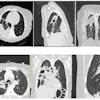The culprit behind a failed hip or knee replacement may exist in the oral cavity, according to a new study in the Journal of Clinical Rheumatology.
DNA testing of bacteria from the fluid that lubricates hip and knee joints had bacteria with the same DNA as the plaque from patients with periodontal disease and in need of a joint replacement, according to researchers from the Case Western Reserve University School of Dental Medicine (JCR April 2012, Vol. 18:3, pp. 117-121).
Working with University Hospitals Case Medical Center researchers, the dental, orthopedic and arthritis researchers suggest it might be the reason why aseptic loosening or prosthetic wear of the artificial joints fail within 10 years when no infection appears to be present.
Nabil Bissada, BDS, DDS, MSD, chair of the department of periodontics at the dental school, said the objective of the study was to see if bacteria like Fusobacterium nucleatum and Serratia proteamaculans found in patients with periodontal disease were present in the fluid.
He and his colleagues studied 36 patients seeking care at the University Hospitals Case Medical Center for osteoarthritis and rheumatoid arthritis. These patients had both natural and artificial joints and signs of periodontitis and had undergone exams where dental plaque was obtained for the study.
The researchers used polymerase chain reactions and DNA sequence analysis of specific genes (16S-23S rRNA) to detect bacteria in the plaque and joint fluid.
Five of the 36 patients (14%) showed direct DNA links between the bacteria in the fluid and plaque from the mouth: one from a rheumatoid arthritis patient with a failed natural joint, one rheumatoid arthritis patient with a failed replacement joint, two osteoarthritis patients with failed artificial joints, and one osteoarthritis patient with a failed natural joint.



















